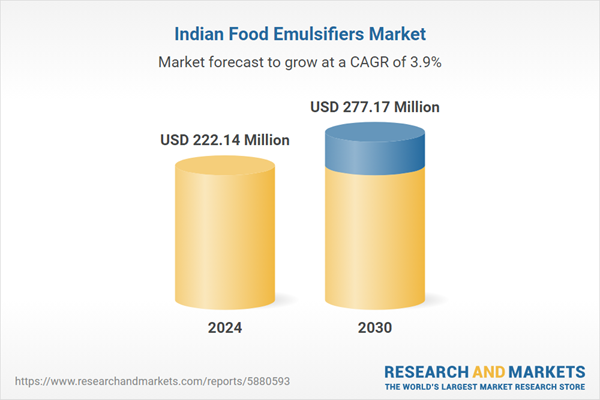Speak directly to the analyst to clarify any post sales queries you may have.
10% Free customizationThis report comes with 10% free customization, enabling you to add data that meets your specific business needs.
Key Market Drivers
Growing Usage in Food and Beverage Industry is Propelling the Market
Emulsifiers, which help in blending and stabilizing oil and water mixtures, play a crucial role in the food and beverage industry. They act as binding agents that maintain product consistency and texture over time. In items like mayonnaise, sauces, and salad dressings, emulsifiers ensure a smooth, creamy texture while preventing separation of ingredients. They contribute to a pleasant mouthfeel and prevent the formation of lumps or clumps, enhancing the overall quality and shelf life of products during storage and distribution.Key Market Challenges
Fluctuations in Prices of Raw Materials
The primary raw materials for food emulsifiers - such as vegetable oils, fats, and proteins - are derived from natural sources and are vulnerable to price fluctuations influenced by climate change, geopolitical dynamics, and shifts in global supply and demand. These unpredictable changes in raw material costs can disrupt supply chains and cause delays in production and distribution. Manufacturers often face difficulties in sourcing consistent, cost-effective raw materials, which can hamper their ability to meet consumer demand. Additionally, this pricing uncertainty can discourage investment in R&D, limiting innovation in new product development.Key Market Trends
Stringent Regulatory Landscape
Growing consumer preference for natural and clean-label ingredients has led to increased regulatory oversight of emulsifiers in India. Authorities like the Food Safety and Standards Authority of India (FSSAI) are enforcing strict compliance with safety and labeling standards. This regulatory emphasis is prompting manufacturers to adopt higher safety and quality benchmarks throughout production, storage, and distribution. In an effort to facilitate international trade, India is also aligning its regulatory framework with global food safety standards, opening new opportunities for domestic manufacturers in overseas markets.Key Market Players
- ADM Agro Industries India Private Limited
- Ingredion India Pvt. Ltd.
- KERRY INGREDIENTS INDIA PRIVATE LIMITED
- AAK India Private Limited
- Puratos India
- DSM India Private Limited
- Cargill India Pvt. Ltd.
- Corbion India Pvt Ltd
- BASF India Ltd
- SAVANNAH SURFACTANTS LIMITED
Report Scope:
In this report, the India Food Emulsifiers Market has been segmented into the following categories, in addition to the industry trends which have also been detailed below:India Food Emulsifiers Market, By Type:
- Lecithin
- Mono- & Diglycerides and Derivatives
- Others
India Food Emulsifiers Market, By Source:
- Plant
- Animal
India Food Emulsifiers Market, By Functionality:
- Emulsification
- Starch Complexing
- Protein Interaction
- Others
India Food Emulsifiers Market, By Application:
- Bakery Products
- Confectionery
- Convenience Foods
- Dairy Products
- Others
India Food Emulsifiers Market, By Region:
- North India
- South India
- West India
- East India
Competitive Landscape
Company Profiles: Detailed analysis of the major companies present in the India Food Emulsifiers Market.Available Customizations:
With the given market data, the publisher offers customizations according to a company's specific needs. The following customization options are available for the report.Company Information
- Detailed analysis and profiling of additional market players (up to five).
This product will be delivered within 1-3 business days.
Table of Contents
Companies Mentioned
- ADM Agro Industries India Private Limited
- Ingredion India Pvt. Ltd.
- KERRY INGREDIENTS INDIA PRIVATE LIMITED
- AAK India Private Limited
- Puratos India
- DSM India Private Limited
- Cargill India Pvt. Ltd.
- Corbion India Pvt Ltd
- BASF India Ltd
- SAVANNAH SURFACTANTS LIMITED
Table Information
| Report Attribute | Details |
|---|---|
| No. of Pages | 80 |
| Published | July 2025 |
| Forecast Period | 2024 - 2030 |
| Estimated Market Value ( USD | $ 222.14 Million |
| Forecasted Market Value ( USD | $ 277.17 Million |
| Compound Annual Growth Rate | 3.8% |
| Regions Covered | India |
| No. of Companies Mentioned | 10 |









